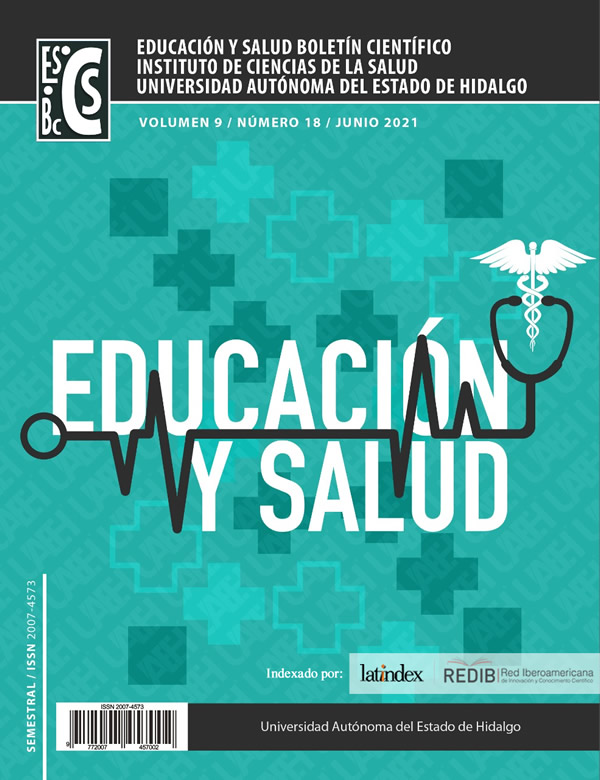Coadjutant effect of the consumption of specific nutrients during antineoplastic treatments
Abstract
In Mexico, cancer represents the third cause of mortality, being obesity a trigger for its appearance; while the condition and therapy themselves cause a series of conditions that deteriorate the quality of life of those who suffer it. The relationship between nutritional status and the appearance and treatment of chronic non-communicable diseases has led to search in nutrition for preventive and palliative support. In this sense, the function of various bioactive compounds during the treatment of neoplastic diseases is analyzed. 15 articles with relevant information on consumption or supplementation were analyzed, mainly antioxidants, polyphenols, highlighting phenolic acids, stilbenes, curcuminoids and flavonoids; vitamins E and D, fiber, EPA / DHA, isothiocyanates, lectins, probiotics and prebiotics and glutamine. According to the temporality of the disease, the compounds would have an effect as chemopreventive, chemotherapeutic or palliative. Also being able to act through epigenetic regulation given the exposure of genes to the environment, in this case, food. Although the compounds analyzed have a protective, anti-inflammatory, anti-tumor and anti-proliferative effect, among other more specific ones, further research is necessary to determine recommended doses and timing of their consumption; in addition to ruling out risks derived from its consumption
Downloads
References
Aldaco-Sarvide, F., Pérez-Pérez, P., Cervantes-Sánchez, G., Torrecillas-Torres, L., Erazo-Valle-Solis, A., Cabrera-Galeana, P., . . . Cárdenas-Cárdenas, E. (2018). Mortalidad por cáncer en México: Actualización 2015. Gac Mex Oncol, (17), 28-34.
Villegas, C., & García, M. (2013). La nutrición en la inmundad y el cáncer. Rev Argent Endocrinol Metab, 51(1), 30-36.
Martínez-López, E., García-García, M., Campos-Pérez, W., & González-Becerra, K. (2013). Genómica nutricional: Conceptos y expectativas. Revista de endocrinología y nutrición, 21(1), 22-34.
Martínez-Rodríguez, T., González, W., Altamiranda, J., Padilla, I., & Machacon, S. (2020). Caracterización del uso de terapias complementarias y alternativas relacionadas con la alimentación en pacientes oncológicos de un centro hospitalario de Cartagena, Colombia. Nutr clín hosp, 40(2), 149-158.
Gámez-Villazana, J. (2020). Avances en la determinación de compuestos bioactivos en alimentos. cienc tecnol agrollanía, 19, 7-17.
Meléndez-Sosa, M., García-Barrales, A., & Ventura-García, N. (2020). Perspectivas e impacto en la salud del consumo de los alimentos funcionales y nutracéuticos en México. Revista RD, 6(1), 114-136.
Molina, R. (2016). El paciente oncológico del siglo XXI. Maridaje terapéutico Nutrición-Oncología. Nutr Hosp, 33(1), 3-10.
Arellano, A., Jiménez, F., & Salcedo, V. (2013). Suplementos dietéticos como tratamiento en el cáncer cervicouterino;. Nutr Hosp, 28(6), 1770-1780.
Serna-Thomé, G., Castro-Eguiluz, D., Fuchs-Tarlovsky, V., Sánchez-López, M., Delgado-Olivares, L., Coronel-Martínez, J., . . . Cetina-Pérez, L. (2018). Use of functional foods and oral supplements as adjuvants in cancer treatment. Rev Inves Clin, 70, 136-146.
Álvarez-Altamirano, K., Mendoza-Hernández, A., Carcoba-Tenorio, C., García-García, J., & Fuchs-Tarlovsky, V. (2016). Antioxidant supplementation during oncology treatment has no effect on cervical cancer recurrence. Nutr Hosp, 33(2), 411-414.
Lall, R., Syed, D., Adhami, V., Khan, M., & Mukhtar, H. (2015). Dietary Polyphenols in Prevention and Treatment of Prostate Cancer. Int. J. Mol. Sci., 16, 3350-3376.
Zhou, Y., Li, Y., Zhou, T., Zheng, J., Li, S., & Li, H. (2016). Dietary Natural Products for Prevention and treatment of liver cancer. Nutrients, 8(156).
Dahdouh, S., Bermejo, L., López, B., Palma, S., Peregrina, B., Santamaría, B., & Gómez, C. (2017). Revisión de la evidencia científica sobre el papel de compuestos bioactivos de alimentos como coadyuvantes a los tratamientos antineoplásicos de cáncer de mama. Rev Esp Nutr Comunitaria, 23(2).
Lin, B., Gong, C., Song, H., & Cui, Y. (2017). Effects of anthocyanins on the prevention and treatment of cancer. British journal Pharmacology, 174, 1226-1243.
Arends, J., Bachmann, P., Baracos , V., Barthelemy, M., Hartmut, B., Bozzeti, F., . . . Preiser, J. (2017). ESPEN guidelines on nutrition in cancer patients. Clinical Nutrition, 36(1), 11-48.
De la Rosa, O., Meneses, A., Ruiz, H., Astudillo, H., Bargalló, E., Lara-Medina, F., . . . Ibarra, A. (2019). Effects of omega-3 fatty acids supplementation on neoadjuvant chemotherapyinduced. Nutr Hosp, 36(4), 769-766.
Jin, X., Ruiz, J., Sze, D., & Chan, G. (2016). Ganoderma lucidum (Reishi mushroom) for cancer treatment. Cochrane database of Systematic Reviews, 4(CD007731).
Hernando-Requejo, O., García del Quinto, H., & Rubio, M. (2019). Nutrición como factor epigenético regulador del cáncer. Nutr hosp, 36(Extra 3), 53-57.
Caballero-Gutiérrez, L., & Gonzáles, G. (2016). Alimentos con efecto anti-inflamatorio. Acta Médica Peruana, 33(1), 50-64.
Karlic, H., & Varga, F. (2011). Impact of vitamin D metabolism on clinical epigenetics. Clinical Epignetics, 55-61.











